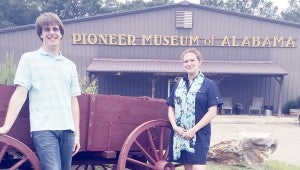Museum directors attend conference
Published 3:00 am Thursday, July 2, 2015

MESSENGER PHOTO/JAINE TREADWELL
Kari Barley, Pioneer Museum of Alabama director, and Seth Kinard, museum assistant director, attended the Association for Living History Farm and Agriculture Museum Annual Meeting and Conference in Williamsburg, Va. They brought back ideas for new programs and activities and are making plans to implement them.
What better place to soak up America’s history and bask in the culture of the colonists that at Colonial Williamsburg and in Williamsburg, Va.
Kari Barley, Pioneer Museum of Alabama director, and Seth Kinard, museum assistant director, attended the Association for Living History Farm and Agriculture Museum (ALHFAM) Annual Meeting and Conference in Williamsburg June 19-23 and came home richer for the experience.
“ALHFAM is a unique learning experience because of the opportunities to participate in hands-on activities and to share ideas with museum directors from across the country,” Barley said. “It’s probably not anything we think about but there is a difference between history and heritage. History teaches us. Heritage shows us. At ALHFAM, we learn about history and we experience history.”
For Barley, ALHFAM is a unique networking opportunity.
“We learn from the experiences of other directors about programs, events and activities that have worked for them and things that have not worked and why,” she said. “These directors are resources that we can look to later for guidance when we are considering or implementing new programs.”
Barley said topics of formal and informal discussions at the ALHFAM conference were often about finances and local support.
“A lot of museums are struggling, both financially and from a lack of local support,” she said. “All of us were in agreement that we must stay true to our mission but also offer new and shiny things. Museums are teaching tools but we must also be entertaining.”
Kinard said the conference was a beneficial experience for him and his visits to Colonial Williamsburg brought history to life and renewed his commitment to bring history to life in more and different ways at the Pioneer Museum of Alabama.
“The way to everybody’s heart is through the stomach and I was interested in the foodways programs,” Kinard said, laughing. “We can teach a lot of history through food-related programs, through gardening programs and other agricultural activities.”
Kinard didn’t participate in the Farmer Boot Camp program but liked the idea of having people come to the museum and actually participating in farm activities.
“I like the idea of a heritage boot camp where participants could experience a variety of old-time activities,” he said. “What I especially enjoyed about ALHFAM was being with people who valued the same things that I do. At Colonial Williamsburg and at ALHFAM, we were all interested in history and our heritage and eager to talk about them. It was just great being there.
For Barley, ALHFAM was the second conference she has had the opportunity to attend in 2014-2015. She was one of only 18 museum directors from across the nation who were invited to attend the Jekyll Island Management Institute (JIMI) in the fall. JIMI is a nationally recognized museum management-training program.
“JIMI was an intense training program and one of the best educational experiences I’ve had,” Barley said. “There is more to being the director of a museum than anyone might think. I appreciated the opportunity to learn from others and came back much more prepared to write grants and with several new program ideas.”



